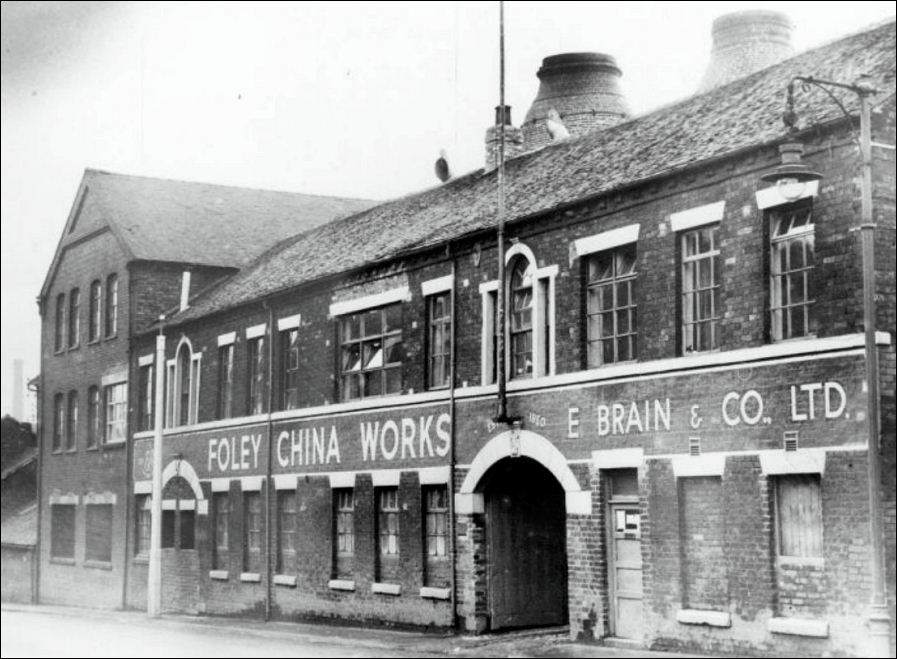E. Brain & Co Ltd
Company History
The Foley China Works in Fenton, were originated by a Mr. William Robinson in 1850. From c.1864-72 Robinson was in partnership with a Mr Hudson – operating as Robinson, Hudson (& Co.). At some time later there was a partnership between W Robinson, David Chapman and Henry Hill who operated at the Foley Works as Robinson & Co. In 1875 Henry Hill retired from the partnership. This partnership also had another business at the Royal Porcelain Works in Longton which operated as Robinson, Chapman and Co. By 1881 father and son William Robinson and William John Robinson were operating as Robinson & Son at the Foley Works.
Elijah Brain, who was chief cashier and a partner in Robinson and Son, then with new partners, A. B. Jones and W. Hawker, took over the business and Foley works of Robinson & Son in 1885. They retailed the trade name and marks of Robinson & Son until 1903 from when they traded under the name E. Brain & Co. Mr Hawker withdrew from the business soon after and his place was taken by Elijah Brain’s son William Henry Brain.
By the time E. Brain died in 1910 the business was under the direction of his son W.H. Brain who expanded its markets overseas especially to Australia and New Zealand. During the years before the First World War the company introduced, well received, new decorative styles which created such a demand that a minor revolution in design started within the pottery industry, the newer styles being copied by many other firms. However, the new Art deigns didn’t always prove as popular with the buying public, as was the prevailing floral patterns, so were not always long lived.
In 1924 W. H. Brain went into semi-retirement due to ill-health. W. H. Brain’s son Eustace William Brain joined the company in 1931 although it was a few years before he joined the Board of Directors. In 1932 the company opened a showroom in Hatton Gardens, the jewellery quarter of London and appointed Thomas Fennemore as a director. Between 1932 and 1934 he was instrumental in arranging an exhibition of tableware by the company, held at Harrods. Amongst papers held at the Victoria and Albert Museum are his Design Policy, Scheme for Sales Development, publicity materials, photographs and publicity material relating to Fennemore’s work at EB&Co.

China, pottery manufacturers
The Second World War caused huge disruption to the pottery industry with many factories requisitioned for war work. After the war the only goods available to British buyers were seconds or undecorated “utility” ware, all quality decorated ware being exported in order to boost the countries income.
The company took-over H.M. Williamson & Sons in 1941. Williamson’s had been founded in 1879 in Longton were they made fine bone china tea ware under the “Heathcote China” trade name. Williamson and sons were also very well known for their children’s china with patterns such as the Willebeek series featuring nursery rhymes.

The 1951 Festival of Britain provided a much needed boast to the pottery industry. While the local market gradually recovered by 1956 it was estimated that 70% of total output was destined for the export market with the greater part marked for the dollar market. Considerable alterations and necessary improvements were made to the factory after the war years. The factory had become smokeless – the traditional bottle kilns having being replaced by an electric tunnel kiln for firing decorated ware and a gas tunnel oven for ghost firing. The working conditions had also been greatly improved, bringing the factory into line with up-to-date requirements. By 1956 Eustace William Brain was Managing Director with another director, one T. H. F. Shirley.

In 1958 Messrs E. Brain & Co Ltd took over the name and goodwill of Coalport China Ltd. and started to transfer the Coalport business to the Foley China Works. After purchasing Coalport China the Head of Design at EB&Co, Donald Brindley, lead a team to design new shapes and patterns to resurrect the Coalport business. The combining of the two businesses was completed in 1963 from which date all production continued solely under the Coalport name.
Coalport and E Brain & Sons became part of the Wedgwood Group in 1967 and in 1985 moved to the Minerva Works in Park Street, Fenton, which had been the works of “The Crown Staffordshire Porcelain & Co Ltd” who themselves had become part of the Wedgwood Group in 1973. In 1995 Wedgwood sold the remaining buildings of Foley China Works to James Kent Ltd who operated the adjacent Old Foley Pottery. James Kent (1989) Ltd closed c.2008 and by 2010 both the Foley China Works and the Old Foley Pottery had been demolished.
